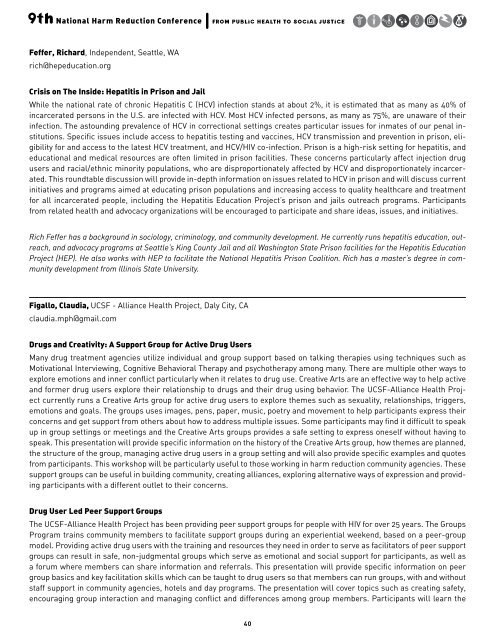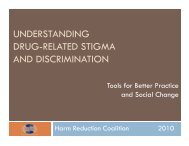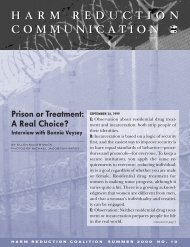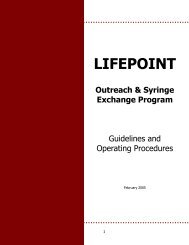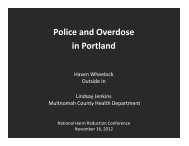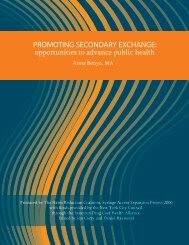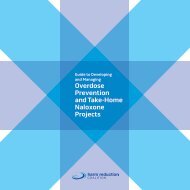9th - Harm Reduction Coalition
9th - Harm Reduction Coalition
9th - Harm Reduction Coalition
Create successful ePaper yourself
Turn your PDF publications into a flip-book with our unique Google optimized e-Paper software.
<strong>9th</strong><br />
National <strong>Harm</strong> <strong>Reduction</strong> Conference<br />
FROM PUBLIC HEALTH TO SOCIAL JUSTICE<br />
Feffer, Richard, Independent, Seattle, WA<br />
rich@hepeducation.org<br />
Crisis on The Inside: Hepatitis in Prison and Jail<br />
While the national rate of chronic Hepatitis C (HCV) infection stands at about 2%, it is estimated that as many as 40% of<br />
incarcerated persons in the U.S. are infected with HCV. Most HCV infected persons, as many as 75%, are unaware of their<br />
infection. The astounding prevalence of HCV in correctional settings creates particular issues for inmates of our penal institutions.<br />
Specific issues include access to hepatitis testing and vaccines, HCV transmission and prevention in prison, eligibility<br />
for and access to the latest HCV treatment, and HCV/HIV co-infection. Prison is a high-risk setting for hepatitis, and<br />
educational and medical resources are often limited in prison facilities. These concerns particularly affect injection drug<br />
users and racial/ethnic minority populations, who are disproportionately affected by HCV and disproportionately incarcerated.<br />
This roundtable discussion will provide in-depth information on issues related to HCV in prison and will discuss current<br />
initiatives and programs aimed at educating prison populations and increasing access to quality healthcare and treatment<br />
for all incarcerated people, including the Hepatitis Education Project’s prison and jails outreach programs. Participants<br />
from related health and advocacy organizations will be encouraged to participate and share ideas, issues, and initiatives.<br />
Rich Feffer has a background in sociology, criminology, and community development. He currently runs hepatitis education, outreach,<br />
and advocacy programs at Seattle’s King County Jail and all Washington State Prison facilities for the Hepatitis Education<br />
Project (HEP). He also works with HEP to facilitate the National Hepatitis Prison <strong>Coalition</strong>. Rich has a master’s degree in community<br />
development from Illinois State University.<br />
Figallo, Claudia, UCSF - Alliance Health Project, Daly City, CA<br />
claudia.mph@gmail.com<br />
Drugs and Creativity: A Support Group for Active Drug Users<br />
Many drug treatment agencies utilize individual and group support based on talking therapies using techniques such as<br />
Motivational Interviewing, Cognitive Behavioral Therapy and psychotherapy among many. There are multiple other ways to<br />
explore emotions and inner conflict particularly when it relates to drug use. Creative Arts are an effective way to help active<br />
and former drug users explore their relationship to drugs and their drug using behavior. The UCSF-Alliance Health Project<br />
currently runs a Creative Arts group for active drug users to explore themes such as sexuality, relationships, triggers,<br />
emotions and goals. The groups uses images, pens, paper, music, poetry and movement to help participants express their<br />
concerns and get support from others about how to address multiple issues. Some participants may find it difficult to speak<br />
up in group settings or meetings and the Creative Arts groups provides a safe setting to express oneself without having to<br />
speak. This presentation will provide specific information on the history of the Creative Arts group, how themes are planned,<br />
the structure of the group, managing active drug users in a group setting and will also provide specific examples and quotes<br />
from participants. This workshop will be particularly useful to those working in harm reduction community agencies. These<br />
support groups can be useful in building community, creating alliances, exploring alternative ways of expression and providing<br />
participants with a different outlet to their concerns.<br />
Drug User Led Peer Support Groups<br />
The UCSF-Alliance Health Project has been providing peer support groups for people with HIV for over 25 years. The Groups<br />
Program trains community members to facilitate support groups during an experiential weekend, based on a peer-group<br />
model. Providing active drug users with the training and resources they need in order to serve as facilitators of peer support<br />
groups can result in safe, non-judgmental groups which serve as emotional and social support for participants, as well as<br />
a forum where members can share information and referrals. This presentation will provide specific information on peer<br />
group basics and key facilitation skills which can be taught to drug users so that members can run groups, with and without<br />
staff support in community agencies, hotels and day programs. The presentation will cover topics such as creating safety,<br />
encouraging group interaction and managing conflict and differences among group members. Participants will learn the<br />
40


